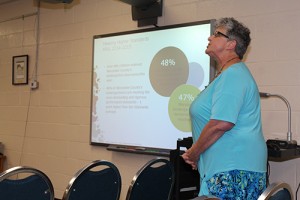
BERLIN – A new assessment administered by teachers in Worcester County’s public schools shows that just under half of the children starting kindergarten are meeting state performance standards.
The Kindergarten Readiness Assessment, administered for the first time at the start of the 2014-2015 school year, revealed that 48 percent of the children entering kindergarten in Worcester County were “demonstrating readiness.” Statewide, 47 percent of kindergarteners were deemed ready at the beginning of the school year.
“What’s important to remember is this assessment isn’t rating the kindergarten school year,” said Judy Rutkiewic, coordinator of instruction for Worcester County Public Schools. “It’s rating everything before.”
According to Rutkiewic 480 students entered kindergarten in Worcester County during September 2014. They were given the Kindergarten Readiness Assessment sometime between the first day of school and the beginning of October. Results showed that 48 percent of the children started school with the skills and behaviors needed to take part in the kindergarten curriculum. Forty percent of the students tested were found to be “approaching readiness” for kindergarten while 11 percent of those assessed were categorized as “emerging readiness.” That category, Rutkiewic explained, meant they displayed the minimal skills and behaviors needed to meet kindergarten expectations.
The assessment revealed that while 64 percent of kindergarteners coming from middle to high income homes were ready to start school, just 31 percent of the children coming from families in the Free and Reduced Meals (FARMS) program were ready for school.
“Needless to say we’ve got work to do,” Rutkiewic said, adding that nearly half of the county’s 480 kindergarteners last year were FARMS students.
More than half of the students tested were found to be ready in the categories of language/literacy, physical well-being and social foundations, but just 40 percent were considered sufficiently skilled in math.
Rutkiewic said the results of the Kindergarten Readiness Assessment, which will be administered to children starting school this year as well, illustrates the significance of the county’s early childhood education programs.
“This data really shows how important our birth to five initiatives are,” she said.
Following administration of the assessment in the fall, teachers will receive students’ results so they will know if they need to adjust their lesson plans for particular children.
“Last year, because it was the first year, teachers did not receive a report about their students immediately,” Rutkiewic said, “but this year they will get a report about their children to see where their strengths and weaknesses are and they’ll be able to make decisions in instruction.”
The data will also be valuable to school system officials as they apply for grants, implement family involvement programs and curriculum changes.

